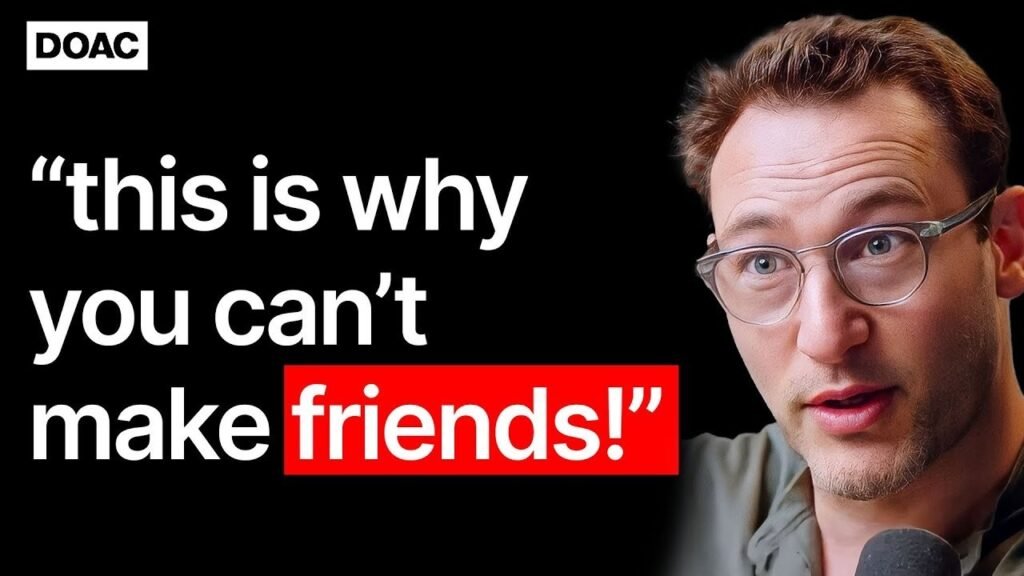Summary
Scott Galloway discusses how to build wealth through discipline, investing early, and understanding the importance of economic security.
The discussion centers around the concept that hard work alone does not guarantee wealth, and that the most effective approach to achieving long-term economic security is often mundane and systematic. Scott Galloway emphasizes that the key to building wealth involves strategic risk-taking, understanding the power of compound interest, and making informed financial decisions. This chapter explores how to leverage one’s advantages at different life stages, the significance of diversification, and the importance of financial literacy.
Highlights
- 🚀 Hard work alone won’t build wealth; focus on smart investing.
- 💡 Leverage your advantages in your 20s, like time and flexibility.
- 📈 Compound interest is a powerful ally in wealth accumulation.
- 🤝 Surround yourself with supportive individuals for guidance.
- 🏠 Real estate can be a tax-advantaged investment if held long-term.
- 📊 Diversification is key to mitigating financial risks.
- 🗣️ Storytelling is crucial for effective communication and influence.
Key Insights
- 📉 The Importance of Early Investing: Starting to invest early, even with small amounts, can lead to significant wealth due to the effects of compounding interest over time. The earlier you start, the more you benefit from compounding growth.
- 💪 Risk and Flexibility in Youth: In your 20s, you can afford to take more risks because you have fewer obligations. This is the perfect time to explore various career paths and investments without the burden of significant responsibilities.
- 🏦 Understanding Financial Literacy: Many people lack basic financial knowledge, which leads to poor spending habits. Open discussions about money can improve financial literacy and empower individuals to make better decisions.
- 🔍 The Power of Diversification: Investing in a variety of assets reduces risk. By diversifying investments, one can protect against market volatility and ensure a more stable financial future.
- 🤝 Networking and Relationships: Building a supportive network can lead to opportunities and guidance. Relationships are crucial for personal and professional growth, and fostering them can yield long-term rewards.
- 🔄 The Role of Real Estate: Real estate can be a solid investment with tax benefits if you plan to hold onto it for a significant period. It can act as a form of forced savings.
- 📖 Mastering Storytelling: Effective storytelling can enhance persuasion and influence. It’s a crucial skill for entrepreneurs and influencers alike, helping them communicate their vision and engage their audience.
Your Path to Economic Security and Wealth Building
The Boring Path to Wealth
- The notion that boring strategies, such as consistent investing and disciplined spending, are often more effective for wealth accumulation than flashy, high-risk ventures.
- Galloway asserts that investing early, even small amounts, can lead to substantial growth over time due to the power of compound interest.
Key Strategies for Wealth Building
- Leverage Advantages:
- In your 20s, flexibility and time allow for risk-taking and exploration of various career paths.
- Emphasis on finding your talent instead of just your passion.
- Invest in Yourself:
- The importance of gaining credentials and networking in super cities where economic growth is concentrated.
- Seek opportunities in growing industries, which typically offer higher returns.
- Start Investing Early:
- Galloway uses a bucket of sand analogy to demonstrate how consistent investing (e.g., $1,000 a month) leads to significant wealth by retirement age.
- Avoid the trap of waiting until you have a large sum before starting to invest.
The Importance of Financial Discipline
- 98% of individuals tend to spend all their income, highlighting the need for self-discipline in saving and investing.
- The significance of forced savings through employer-sponsored plans or apps that automate investments.
Diversification: A Safe Harbor
- Galloway advocates for diversification as a strategy to mitigate risk, arguing that it is essential to spread investments across various assets to safeguard against downturns.
- He points out that many wealthy individuals do not put all their wealth into one venture, instead opting for multiple income streams.
Real-World Examples and Insights
- Galloway shares his personal experiences of wealth loss and recovery, emphasizing that diversification saved him from financial ruin.
- He cites the case of his friend who was able to accumulate wealth through disciplined savings despite starting with little.
The Role of Relationships in Wealth Building
- Relationships are crucial; Galloway suggests surrounding oneself with a kitchen cabinet of mentors and advisors to guide financial decisions.
- The importance of networking and how opportunities often arise through connections made in personal and professional settings.
To implement the ideas, insights, habits, and recommendations from Scott Galloway’s discussion into your life, you can follow a structured approach that integrates these principles into your daily actions, financial decisions, and personal growth strategies. Here’s how you can make these points significant in your life:
Real World Implementation
1. Start Investing Early
- Action Plan: Begin by setting aside a portion of your income for investment in low-cost ETFs or diversified assets. Use a compound interest calculator to visualize the long-term growth potential of your investments.
- Example: If you haven’t already, open an investment account with a provider like Vanguard and automate monthly contributions to a diversified ETF portfolio.
2. Focus on Diversification
- Action Plan: Diversify your investments across different asset classes (e.g., stocks, bonds, real estate) to reduce risk and ensure steady growth. Regularly review and adjust your portfolio.
- Example: Allocate a portion of your investments to different sectors or asset classes, ensuring that no single investment dominates your portfolio.
3. Learn and Apply Tax Strategies
- Action Plan: Educate yourself on tax strategies that can help you retain more of your earnings, such as tax-advantaged accounts (e.g., IRAs, 401(k)s), and consider consulting a tax advisor.
- Example: Maximize contributions to tax-advantaged retirement accounts and explore strategies like tax-loss harvesting or charitable giving to reduce taxable income.
4. Develop Storytelling Skills
- Action Plan: Practice storytelling in both professional and personal contexts to enhance your ability to communicate ideas, persuade others, and lead effectively.
- Example: Join a public speaking club like Toastmasters or take a course on storytelling in business to improve your communication skills.
5. Take Calculated Risks
- Action Plan: Identify opportunities where calculated risks could lead to significant rewards, whether in entrepreneurship, career moves, or investments. Balance these risks with thorough research and preparation.
- Example: If considering a business venture, create a detailed business plan, conduct market research, and start with a small pilot to test your ideas.
6. Consider Real Estate Investment
- Action Plan: Explore real estate as a potential investment by educating yourself on the market, financing options, and tax advantages. Consider starting small, such as purchasing a rental property or investing in REITs (Real Estate Investment Trusts).
- Example: Research local real estate markets, and if it fits your financial goals, consider purchasing a property that can generate rental income or appreciating value.
7. Build a Supportive Network
- Action Plan: Actively seek to build and maintain a network of mentors, peers, and professionals who can provide guidance, share opportunities, and offer support in your career and financial endeavors.
- Example: Attend networking events, join professional associations, and engage with online communities related to your field of interest.
8. Practice Financial Discipline
- Action Plan: Align your spending habits with your long-term financial goals. This includes budgeting, saving, and avoiding unnecessary debt to ensure sustainable wealth growth.
- Example: Create a detailed budget that tracks income and expenses, prioritize savings and investments, and regularly review your financial goals.
9. Engage in Continuous Learning
- Action Plan: Commit to lifelong learning by regularly seeking out new knowledge and skills, particularly in areas related to finance, investments, and personal development.
- Example: Read books, take courses, or listen to podcasts on topics like investing, tax strategies, and personal growth. Set aside time each week for learning.
10. Open Discussions About Finances
- Action Plan: Foster open conversations about money and financial strategies with your family, friends, or partner to improve financial literacy and align financial goals.
- Example: Schedule regular financial check-ins with your partner or family to discuss goals, review budgets, and make joint decisions about money management.
Integration into Daily Life:
- Daily Investment Habit: Set up automatic transfers to your investment accounts to ensure consistent contributions without needing to think about it.
- Regular Portfolio Reviews: Schedule quarterly reviews of your investment portfolio to assess diversification and performance, making adjustments as necessary.
- Storytelling Practice: Incorporate storytelling into your daily interactions, whether it’s at work, in presentations, or even in casual conversations to sharpen your skills.
- Risk Assessment: Before making any major financial or career decisions, conduct a thorough risk-benefit analysis to ensure you’re making calculated risks.
- Continuous Learning Routine: Dedicate specific time slots each week to learning, such as reading financial literature on weekends or taking online courses in the evening.
- Networking Activities: Regularly attend networking events, both in-person and online, to build and strengthen your professional network.
- Financial Discussions: Make open discussions about finances a regular practice in your household, helping everyone involved to become more financially literate and aligned.
By systematically incorporating these habits and strategies into your life, you can build a strong foundation for financial security, personal growth, and professional success. Start with small, manageable steps, and gradually expand your efforts as you gain confidence and experience in each area.
QUOTES
- “Investing early in life is like planting seeds that grow into a forest of wealth.”
- “Diversification isn’t just a strategy; it’s a shield against uncertainty.”
- “The art of storytelling is the secret weapon of successful leaders.”
- “Real estate is not just property; it’s a canvas for your financial future.”
- “The richest people are those who invest in relationships as much as portfolios.”
- “Open conversations about money are the foundation of financial literacy.”
- “The true measure of wealth is not what you own, but what you give.”
- “Entrepreneurship is a leap into the unknown with faith in your wings.”
- “Tax strategy is the invisible hand guiding the accumulation of wealth.”
- “Investing isn’t about timing the market; it’s about time in the market.”
FACTS
- Compound interest exponentially increases the value of early investments over time.
- Diversification reduces risk by spreading investments across various assets.
- Strategic tax planning can significantly lower tax liabilities for wealthy individuals.
- Storytelling is a powerful tool for persuasion and leadership in business.
- Real estate offers unique tax advantages and forced savings opportunities.
- Building a network of mentors and peers accelerates career progression.
- Open discussions about finances enhance financial literacy and decision-making.
- Aligning with a partner on financial goals strengthens economic security.
- Understanding tax advantages is crucial for maximizing wealth accumulation.
- Emotional intelligence plays a key role in building successful relationships.


